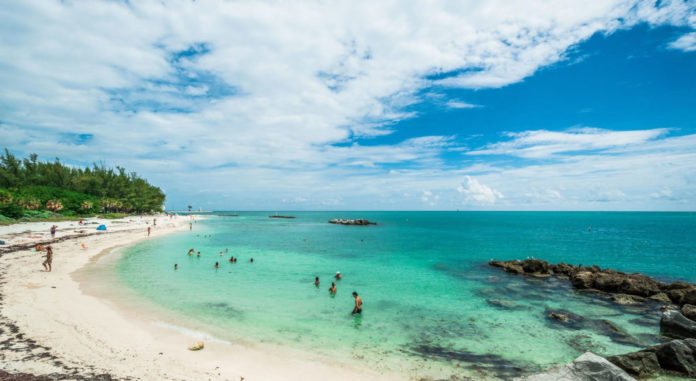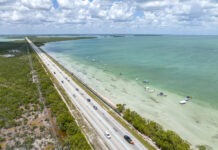In June, Hawaii Governor David Ige signed a trailblazing bill that will ban sunscreens containing chemicals, including oxybenzone, that have been proven harmful to coral reefs. Dr. Craig Downs, executive director of the Haereticus Environmental Laboratory, was an influencing force in the Hawaiian state legislation. Downs has conducted research finding that oxybenzone in sunscreen contaminates coral, fish, marine mammals, bird eggs and sea turtle eggs. He presented his research at the Key West City Commission meeting Tuesday night.
Representatives from the cosmetics and sunscreen industry were also in attendance. Emily Manoso, staff counsel at the Personal Care Products Council, said the FDA has approved sunscreens, and the broad spectrum coverage of oxybenzone-based sunscreens is effective at preventing sun damage and skin cancer. She called the science “incomplete.” Dr. Kurt Reynertson, of Johnson and Johnson’s Regulatory and Stewardship Policy Department, testified that doing more research is “crucial.” He said: “I understand the concern. We want to be sure that we’re doing the right thing.”
Downs said that “sunscreen pollution doesn’t just impact the sunscreen industry,” but restaurants (oxybenzone was detected in fish being served in restaurants in Hawaii), tourism, property values and taxation. He described a “ripple effect,” because of the impact on natural resources in the Keys. “In 1975 we had beautiful reefs,” Downs narrated as he showed photographs, “and now it’s a pile of rubble.” He cited pollution as the cause of high death rates and reproductive failure of coral.
The presentation was compelling: 99 percent of the Florida Keys coral coverage has died in the last 50 years. Downs cited water samples taken at Fort Zachary Taylor, which had oxybenzone at levels comparable to those in Hawaii. Swimmers and sewage are the sources of the oxybenzone levels, and eight other scientific groups corroborate Downs’s research.
Executive Director of Reef Relief Mill McCleary also testified to the damage of oxybenzone sunscreens to the reef. He suggested viable alternatives, like zinc oxide sunscreens. Others also testified in favor and against the ban. Commissioner Jimmy Weekley spoke in favor of the ban: “I believe this is truly the right thing to do. We are dependent immensely on the water surrounding our island,” and said it is the community’s responsibility to be “stewards for the next generation.”
The commission voted in favor of postponing the vote until Jan. 15, giving the sunscreen and cosmetics industry equal time to present scientific research in their favor. Commissioners Clayton Lopez and Samuel Kaufman also discussed the need to research alternatives to oxybenzone sunscreens.


























